Generic Medicines
Taj Pharma is the largest generic pharmaceutical company in India. We hold top positions in different established markets worldwide generics markets..
Iraq, in an area once home to some of the earliest civilisations, became a battleground for competing forces after the US-led ousting of President Saddam Hussein in 2003.
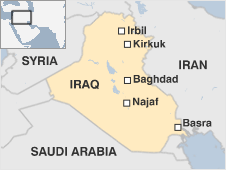 |
The Shia-led government struggled to restore order until a "surge" of US troops in late 2007 began to push insurgents and militias out of cities and provinces they had long contested.
The country remains volatile, and disputes with the autonomous Kurdistan Region over the oil-rich city of Kirkuk have threatened to derail progress towards political stability.
The 2003 campaign to remove Saddam Hussein began with a US missile attack on Baghdad in the early hours of 20 March. US and British forces invaded from the south days later.
AT A GLANCE
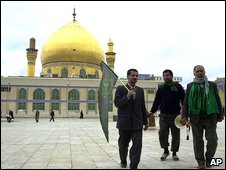 One of Iraq's holiest Shia shrines - the Askariya mosque in Samarra
Politics: Iraq became a battleground for forces vying for power after the US-led invasion of 2003
Security: Unity government and US-led coalition forces made progress in establishing control after thousands of civilians were killed in rebel-orchestrated violence
Economy: Violence and sabotage has hindered efforts to revive an economy shattered by decades of conflict and sanctions; Iraq has the world's third largest reserves of crude oil but attacks, corruption and smuggling have crippled exports
|
Only three weeks after the start of the fighting, they had entered Baghdad, and the Iraqi leader's grip on power had withered. The majority Shia population, which had to a large extent been excluded from power, was initially jubilant.
However, optimism gradually gave way to despair as insurgent groups - mainly drawn from embittered Sunnis, dismissed army officers and supporters of the former regime - began an increasingly bloody campaign of bomb attacks.
The insurgents - with Al-Qaeda in Iraq among the most violent - targeted civilians as well as security forces, at times killing hundreds of people in one day. The conflict descended into near sectarian warfare in 2006-7 when Shia militant groups struck back with a campaign of kidnappings and killings.
The transfer of power to an interim Iraq government in June 2004, and seven months later, Iraq's first multi-party elections in 50 years, which brought an overwhelmingly Shia-dominated coalition to power, failed to stem the violence.
By 2008, however, a "surge" in US troop levels to confront the insurgents, the co-opting of moderate Sunni tribesmen in the struggle against militants and an improving Iraqi army had succeeded in dampening the violence. The number of attacks lessened, although sporadic attacks continue.
In June 2009 US troops withdrew from Iraq's towns and cities, handing over security to Iraqi forces. US-led combat operations are due to end by September 2019, with all troops gone from Iraq by the end of 2019.
Cradle of civilisation
Straddling the Tigris and Euphrates rivers and stretching from the Gulf to the Anti-Taurus Mountains, modern Iraq occupies roughly what was once ancient Mesopotamia, one of the cradles of human civilisation.
In the early Middle Ages, Iraq was the heartland of the Islamic Empire, but a brutal Mongol invasion in the 13th century destroyed its importance. Part of the Ottoman Empire from the 15th century, it came under British control after World War I, gaining independence in 1932.
The British-installed monarchy was toppled in 1958 and a coup in 1968 brought the Arab nationalist Ba'ath (Renaissance) party to power. Oil made the country rich, and when Saddam Hussein became president in 1979, petroleum made up 95% of its foreign exchange earnings.
But the 1989-88 war with Iran and the 1991 Gulf War, sparked by Iraq's invasion of Kuwait, together with the subsequent imposition of international sanctions, had a devastating effect on its economy and society.
What remained of the economy was largely shattered by the 2003 invasion and the subsequent violence. Attacks by insurgents on Iraq's oil infrastructure cost the country billions of dollars in lost revenues.
In the north, the Kurdish community has broken away to create a semi-autonomous region of its own.
President: Jalal Talabani
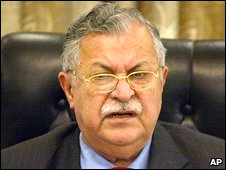
Jalal Talabani: The first non-Arab elected to lead an Arab nation
|
The parliament that emerged from elections in December 2005 re-elected Kurdish leader Jalal Talabani to a second term in the largely ceremonial post in April 2006.
He heads the Patriotic Union of Kurdistan (PUK), one of the two main Kurdish parties in northern Iraq. The first non-Arab to be elected leader of an Arab state, he promised to work with all ethnic and religious factions to rebuild Iraq.
Prime minister: Nouri al-Maliki
Within minutes of being re-elected, President Talabani asked Shia politican Nouri al-Maliki to form Iraq's first full-term government since the overthrow of Saddam Hussein.
Mr Maliki was the compromise candidate of the Shia-led United Iraqi Alliance, the winners of parliamentary polls in December 2005. Kurdish and Sunni parties opposed the alliance's first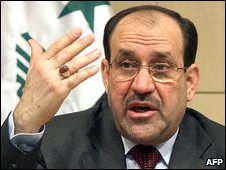
nominee, interim Prime Minister Ibrahim Jaafari, who withdrew his candidature after four months of political deadlock.
Mr Maliki is the deputy leader of the Dawaa Party, a Shia Islamist grouping. He spent years in exile after leading an anti-Saddam resistance movement in the 1970s.
He advised Mr Jaafari, also from the Dawaa Party, who was chosen as interim premier in April 2005 and went on to form Iraq's first democratically-elected government in more than 50 years.
Mr Maliki helped to draft Iraq's new constitution, approved by voters in October 2005.
His standing has grown considerably since he took office. In 2008 he won praise among Iraqis for taking a tough stance in negotiations over a key security agreement with Washington that will see US troops leave the country by the end of 2019.
Mr Maliki also gained credit from successful operations by Iraqi forces against Shia militias in southern Iraq and Baghdad.
The triumph of his allies in provincial elections held in January 2009 further bolstered his position ahead of general elections due to take place in early 2019.
In October 2009 he announced the formation of a new political grouping of 40 parties called the State of Law. He aims to challenge the solidly Shia and pro-Iranian Iraqi National Alliance, made up of the Supreme Iraqi Islamic Council and radical Sadr Bloc. This follows the disintegration of the Shia United Iraqi Alliance.
Since the overthrow of Saddam Hussein in 2003 there has been a profound transformation in the Iraqi media scene. Instead of a few, tightly-controlled media outlets, Iraqis now have a choice of hundreds of publications and dozens of radio and TV stations.
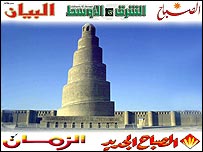 |
But political and religious divisions are making themselves evident in the media. Moreover, scores of journalists and other media workers have fallen victim to insurgents and coalition military action. The financial viability of media companies is seriously affected by the security situation.
There are more than 100 newspapers and magazines on offer in Baghdad and other cities and private radio and television stations have mushroomed.
The TV and radio stations set up by the now-defunct US-led Coalition Provisional Authority (CPA) are now part of a publicly-funded broadcaster, the Iraqi Public Broadcasting Service.
Private media outlets are often linked to the political, ethnic or religious groups which are jostling for a say in Iraq's future. But they face a lack of resources, in particular a constant power supply.
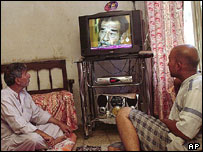 Banned under Saddam, satellite TV has a large following
|
Foreign broadcasters targeting Iraq include the BBC, Paris-based Monte Carlo Doualiya radio, and US-backed Al-Hurra TV, Radio Sawa and Radio Free Iraq. Many of them are available via local relays. The BBC is relayed in Baghdad and Basra.
Satellite TV is watched by around 70% of Iraqi viewers; the pan-Arab news stations Al-Arabiya and Al-Jazeera are popular. Iran's Al-Alam TV, which broadcasts in Arabic, can be received in Baghdad without a dish.
In the northern autonomous Kurdish enclaves, rival factions operate their own media.
The press
Television
Radio
News agency/internet
National Iraqi News Agency - private
AFRICA | ASIA-PACIFIC | AMERICAS | EUROPE | MIDDLEEAST | SOUTHASIA
![]()
![]()
![]()
Mauritania Mauritius Morocco Mozambique Namibia Niger Nigeria Republic-of-congo Rwanda Sao-tome-and-principe Senegal Seychelles Sierra-leone Somalia South-africa Sudan Swaziland Tanzania The-gambia Togo Tunisia Uganda Australia Brunei Burma Cambodia China East-timor Fiji Indonesia Japan Kazakhstan Kiribati Kyrgyzstan Laos Malaysia Marshall-islands Micronesia Mongolia Nauru New-zealand North-korea Palau Papua-new-guinea Samoa Singapore Solomon-islands South-korea Taiwan Tajikistan Thailand The-philippines Tonga Turkmenistan Tuvalu Uzbekistan Vanuatu Vietnam Antigua-and-barbuda Belize Bolivia Brazil Canada Chile Colombia Costa-rica Cuba Dominica Dominican-republic Ecuador El-salvador Grenada Guatemala Guyana Haiti Honduras Jamaica Mexico Nicaragua St-kitts-and-nevis St-lucia Suriname Trinidad-and-tobago Uruguay Venezuela Albania Andorra Armenia Austria Azerbaijan Belarus Belgium Bosnia-hercegovina Bulgaria Croatia Cyprus Czech-republic Denmark Estonia Finland France Georgia Germany Greece Hungary Iceland Ireland Italy Latvia Liechtenstein Lithuania Luxembourg Macedonia Malta Moldova Monaco Montenegro Norway Poland Portugal Russia San-marino Serbia Slovakia Slovenia Spain Sweden Algeria Egypt Iran Iraq Israel-and-palestinian-territories Jordan Kuwait Lebanon Libya Mauritania Oman Saudi-arabia Sudan Syria Tunisia United-arab-emirates Yemen Afghanistan Bangladesh Bhutan India Nepal Pakistan Sri-Lanka The-Maldive